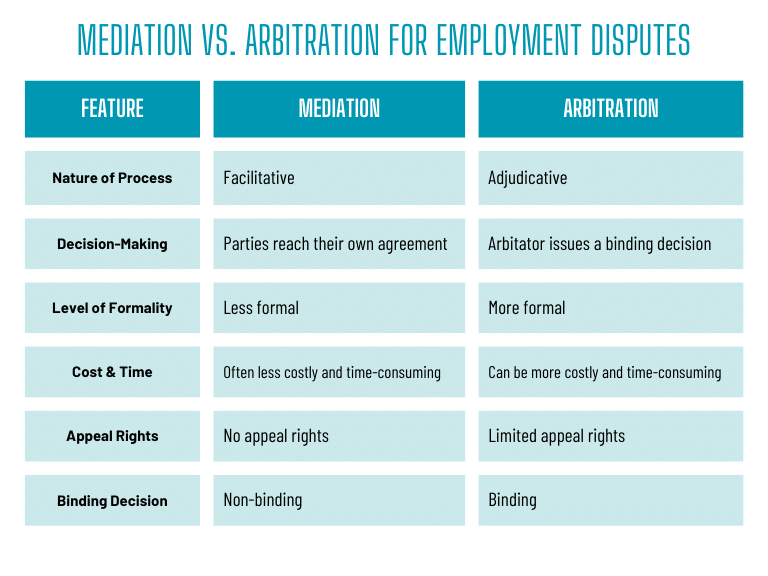Ontario employers have several options to resolve conflicts outside of the traditional court system when faced with employment disputes. Two popular alternatives are mediation and arbitration. Both processes offer a more efficient and less adversarial approach to resolving disputes than litigation. However, they differ in their structure, outcomes, and implications. This blog delves into the key distinctions between mediation and arbitration in the context of Ontario employment law.
Mediation for Employment Disputes
Mediation is a voluntary process where a neutral third party, known as a mediator, facilitates communication between the disputing parties. The mediator’s role is to create a safe and conducive environment for the parties to discuss their issues, identify common ground, and explore potential solutions. The mediator does not impose decisions or judgments but rather helps the parties reach their own agreement.
Key Characteristics of Mediation
Mediation has several features that make it attractive as a dispute resolution option in the employment context.
- Voluntariness: Both parties must agree to participate in mediation. This also can help both parties be invested in the process and outcome.
- Flexibility: The process is highly flexible and can be tailored to the specific needs and circumstances of the dispute.
- Confidentiality: All discussions and information exchanged during mediation are typically confidential.
- Non-Binding: As the outcome of mediation is not legally binding, the mediator cannot issue a final decision. If the parties reach an agreement, it is typically formalized in a written settlement agreement.
Arbitration for Employment Disputes
Arbitration is a more formal process where a neutral third party, known as an arbitrator, acts as a decision-maker. The arbitrator listens to evidence, arguments, and cross-examination and then issues a binding decision that is enforceable in court.
Key Characteristics of Arbitration
The added formality of arbitration offers unique benefits that may make it a better fit for resolving certain disputes, but it also has drawbacks.
- Binding Decision: The arbitrator’s decision is legally binding on both parties.
- Formal Process: Arbitration follows a more structured process, like a court trial, with rules of evidence and procedure.
- Limited Appeal Rights: There are limited grounds for appealing an arbitration award.
- Cost and Time: Arbitration can be more costly and time-consuming than mediation, especially for complex disputes.

Choosing the Right Dispute Resolution Process for Employment Disputes
Whether to choose mediation or arbitration depends on various factors, including the nature of the dispute, the parties’ preferences, and each process’s potential benefits and drawbacks. Some key considerations include:
- Nature of the Dispute: Complex disputes involving multiple parties or intricate legal issues may be more suitable for arbitration, while more straightforward disputes or those requiring a more collaborative approach might benefit from mediation.
- Preservation of the Working Relationship: If preserving a working relationship is important, mediation can be a more suitable option. It fosters communication and understanding and is also less adversarial than arbitration or litigation.
- Cost & Time: Mediation is generally less expensive and time-consuming than arbitration. However, if a quick resolution is crucial, arbitration might be preferable.
- Control Over Outcome: Mediation allows parties greater control over the outcome, while arbitration involves a third-party decision-maker. Arbitration may be preferable in complex disputes requiring a formal process and binding decision.
- Privacy: Both mediation and arbitration offer a more private setting compared to litigation, but the level of confidentiality can vary depending on the specific process.
- Employment Contracts: Many employment contracts contain arbitration clauses, requiring disputes to be resolved through arbitration. In unionized workplaces, the Collective Agreement will likely set out requirements for a particular dispute resolution process.
Hybrid Approaches: Med/Arb and Arb/Med
In some cases, a hybrid approach combining elements of mediation and arbitration can be beneficial.
- Med-Arb: In this approach, mediation is attempted first. If a settlement is not reached, the mediator can transition into the role of an arbitrator, making a binding decision.
- Arb-Med: In this approach, arbitration is conducted first. If both parties do not accept the arbitrator’s decision, a mediator can be brought in to facilitate a settlement. Arb/Med processes may also incorporate a “mini-trial” to present evidence to the arbitrator, followed by mediation to negotiate a settlement.
Willis Business Law Advises Windsor-Essex Employers on Dispute Resolution Processes
Both mediation and arbitration offer valuable alternatives to litigation in the context of Ontario employment law. By carefully considering the abovementioned factors, employers can select the most appropriate dispute resolution process to address their needs and achieve a satisfactory outcome. The skilled employment and labour lawyers at Willis Business Law provide multi-faceted advice and guidance to private and public sector employers across Windsor-Essex County facing workplace disputes. The firm’s wealth of experience and dedication to the community empower it to help employers foster a healthy, profitable workforce.
Based in the heart of Windsor’s financial district and conveniently located close to the courts and various government offices, Willis Business Law proudly serves Windsor-Essex County and the surrounding areas, including Amherstburg, Chatham-Kent, Kingsville, Lakeshore, LaSalle, Leamington, Pelee, Tecumseh, and Sarnia. To discuss your employment law matter with our team, please call 519-945-5470 or contact us online.




